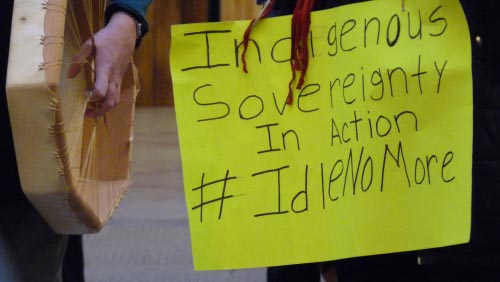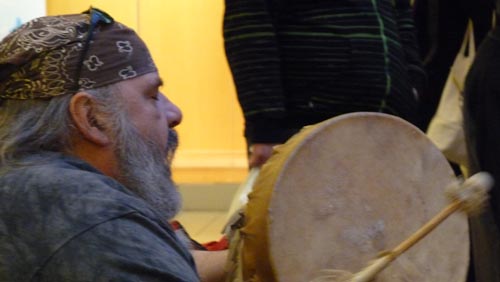
Source: Climate Connections
Canada’s growing Idle No More movement is rippling beyond its borders. And it is sparking much needed action and dialogue as it spreads.
The urgency of this grassroots movement to protect Indigenous rights in Canada was felt on Friday, December 4th, in Vermont, when more than two dozen Indigenous people – including Abenaki, Mi’kmaq, Metis, and Inuit – held a round dance at a mall in South Burlington.
The dance, which included traditional drumming and singing, was held in solidarity with Idle No More. But for many present, including allies and supporters, the significance of the dance goes beyond solidarity: Abenaki tribes have only begun to receive state recognition within the past 3 years, and Abenaki still do not have the same rights as federally recognized Native American tribes.
‘A form of eugenics’
Dee Brightstar, an Abenaki woman who previously served on the tribal council for the Missisquoi Abenaki, noted the similarities between the Harper government’s treatment of First Nations and her people’s history in Vermont.
“The Canadian government passed Bill C-45. That will eliminate Indigenous rights,” she said, referring to the law passed in December that has sparked railroad blockades, round dances, and an ongoing hunger strike by Attawapiskat chief Theresa Spence, which began on December 11.
She fears that First Nations in Canada, some of whom practice more traditional lifestyles than many in the United States, will lose their culture because of the passage of this bill. The Idle No More movement – which is accusing the conservative Harper government of eroding Indigenous land and treaty rights – seems to agree.

Brightstar said, “Bill C-45 is a form of eugenics.” referring to the racist program that included forced sterilization of Abenaki and other poverty-stricken Vermonters in the early 1900′s. Eugenics nearly eliminated the Abenaki people.
Dancing in Unity
The round dance lasted for about 30 minutes. Many passersby stopped to watch and take pictures. Although organizers of the dance received permission from mall management, several security guards stood watch close by.
Participants came from a range of Indigenous nations groups from the US and Canada, according to Brightstar.
The purpose of the afternoon went far beyond standing in solidarity with Idle No More. Tinamarie Lilywalker Russ, a Mi’kmaq, held a sign stating, “Indigenous Sovereignty in Action.”
Several women, including Russ and Brightstar, spoke about a friend’s recent insight that Indigenous people have the power to assert their own sovereignty.
After the dance concluded, spirits were high amongst participants. Plans for more action and gatherings were discussed.
Robin Howland, a Metis from Brandon, Vt., summed up the sense of unity. ”I didn’t come as an individual. I came with everyone, in solidarity.”
Will Bennington is a Development Associate with Global Justice Ecology Project, and a member of Rising Tide Vermont.
